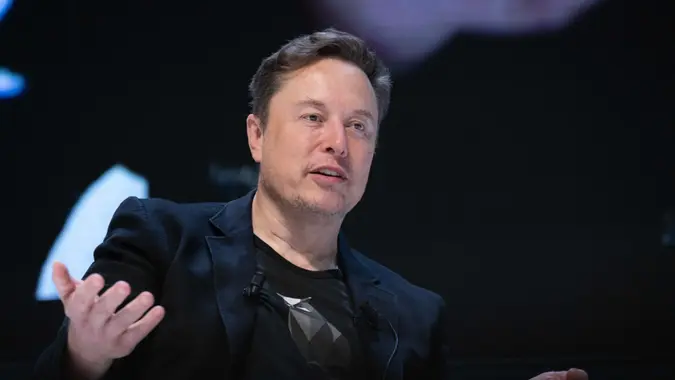Here’s How Much Elon Musk and DOGE Could Save You as a Taxpayer

Commitment to Our Readers
GOBankingRates' editorial team is committed to bringing you unbiased reviews and information. We use data-driven methodologies to evaluate financial products and services - our reviews and ratings are not influenced by advertisers. You can read more about our editorial guidelines and our products and services review methodology.

20 Years
Helping You Live Richer

Reviewed
by Experts

Trusted by
Millions of Readers
Elon Musk and DOGE are on a mission to cut spending in the government. If these efforts are successful, it could mean you’ll pay less money to Uncle Sam.
Since its inception, DOGE claims to have saved $993.79 per taxpayer — a total of $160 billion — according to the agency’s website, as of April 29. This includes approximately $25 billion in contract terminations, around $33 billion in grant terminations and roughly $400 million in lease terminations.
In a March 2025 interview with Fox Business Network’s “Kudlow,” Musk said he hopes to find $1 trillion in savings. This number was reduced from an initial goal of achieving $2 trillion in savings.
Impact on Your Taxes
The more DOGE is able to save, the more it could benefit your bank account. In February 2025, President Donald Trump said his team is considering giving Americans a $5,000 check with the savings — which would equate to 20% of expected DOGE savings — and using another 20% to pay down the national debt.
DOGE is cutting costs at rapid pace, but federal government spending has increased $355 million since last fiscal year, according to the U.S. Treasury Department. For the fiscal year-to-date, spending is at just over $3 trillion, compared with $2.68 trillion during the same time period — October 2023 through February 2024 — last year.
Noah Damsky, CFA, principal at Marina Wealth Advisors in Los Angeles, highlighted two ways DOGE can save money for taxpayers: deregulation and increased efficiency.
“Firing swaths of government employees means fewer employees and leaner government entities, which is a backdoor to deregulation,” he said. “Smaller teams mean less regulation and will spur risk-taking and economic activity.”
Deregulation
Deregulation could have a positive impact, but he said there could also be drawbacks.
“Unfortunately, this likely means more illegitimate activity, as well,” he said. “However, deregulation broadly should spur more activity overall, which can boost GDP over time and result in higher tax revenue.”
Efficiency
As for increased efficiency, Damsky said smaller government teams will need to become more productive if they want to try to achieve the same level of output with fewer employees.
“As someone who worked in local government, I think we could have fired half the team and been just as efficient over time,” he said. “I anticipate this may be a similar perspective at other levels of government.”
While DOGE cuts are new and workers are still getting adjusted, Damsky is optimistic that agencies will be able to properly function with fewer staffers.
“Hopefully, government agencies adjust to fewer employees by increasing production and saving taxpayers money,” he said.
Ultimately, the total amount of money DOGE could save taxpayers remains to be seen. Since the agency has only been around for a few months, time will tell if it ends up saving taxpayers’ money or costing you in more ways than one.
Editor’s note on political coverage: GOBankingRates is nonpartisan and strives to cover all aspects of the economy objectively and present balanced reports on politically focused finance stories. You can find more coverage of this topic on GOBankingRates.com.
 Written by
Written by  Edited by
Edited by 

























